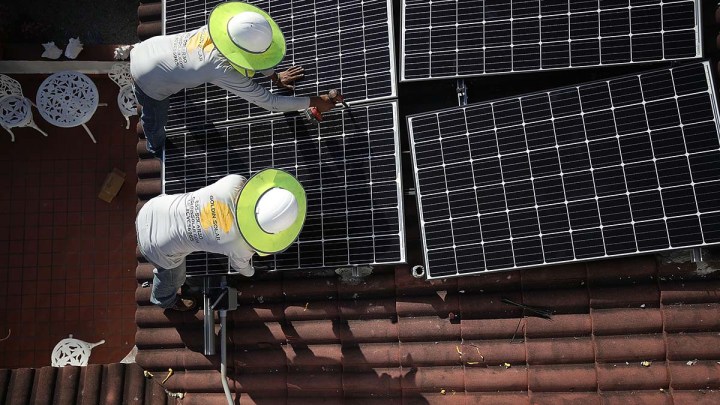
Consumers have a host of new ‘green’ tax incentives to consider
Consumers have a host of new ‘green’ tax incentives to consider

Tax day is coming up: April 18 is the IRS deadline this year.
For anyone who invested in some kind of green technology like solar panels or electric vehicles last year, you may be wondering how or if it will save you money on your tax returns. A little thing called the Inflation Reduction Act introduced a few incentives for that. But the devil, as usual, is in the details.
Tax credits and rebates for buying the latest green tech gadgets are not new. But the tax-saving provisions in the Inflation Reduction Act?
“I absolutely think that this is a game-changer,” said Noah Goldmann with the nonprofit Rewiring America. “And just to give you a sense of the context here, the old tax credit for a heat pump, for example, was $300. Now, it’s $2,000.”
A heat pump is an energy-efficient replacement for a gas furnace. It can cost thousands to install. Then, of course, there’s the solar panel credit, which isn’t new.
“But in 2022, it was sunsetting; the old version of the credit was decreasing each year,” Goldmann said. “Now, it’s back at 30% of the cost of the project for the next 10 years.”
The credit also extends to home battery systems. Tax credits for home insulation can apply over multiple years.
It used to be that you could only get $500 back for energy-efficient windows or doors in total. But the Inflation Reduction Act upped that to 30% of the cost of eligible purchases up to $1,200 per year.
“Since you have the option, you know, maybe you just do a little at a time up to that $1,200, and then the next year, you can do more,” said Lisa Greene-Lewis, a tax expert with TurboTax.
Another big change is the guidelines for tax credits on electric vehicles. These credits have been around since 2009, but the new law changed the rules pretty significantly. They went into effect Aug. 16 of last year. After that purchase date, only cars assembled in North America can qualify for a credit.
“EVs were certainly purchased initially by quite wealthy consumers, and they were able to receive the credit with no limitation,” said Roberta Mann, professor emeritus at the University of Oregon School of Law, where she focuses on how the tax system affects the environment.
There used to be no limit on income levels to qualify for an EV tax credit. With the new rules, you have to earn less than $300,000 as a couple or $150,000 as a single person.
There’s a lot happening in the world. Through it all, Marketplace is here for you.
You rely on Marketplace to break down the world’s events and tell you how it affects you in a fact-based, approachable way. We rely on your financial support to keep making that possible.
Your donation today powers the independent journalism that you rely on. For just $5/month, you can help sustain Marketplace so we can keep reporting on the things that matter to you.

















